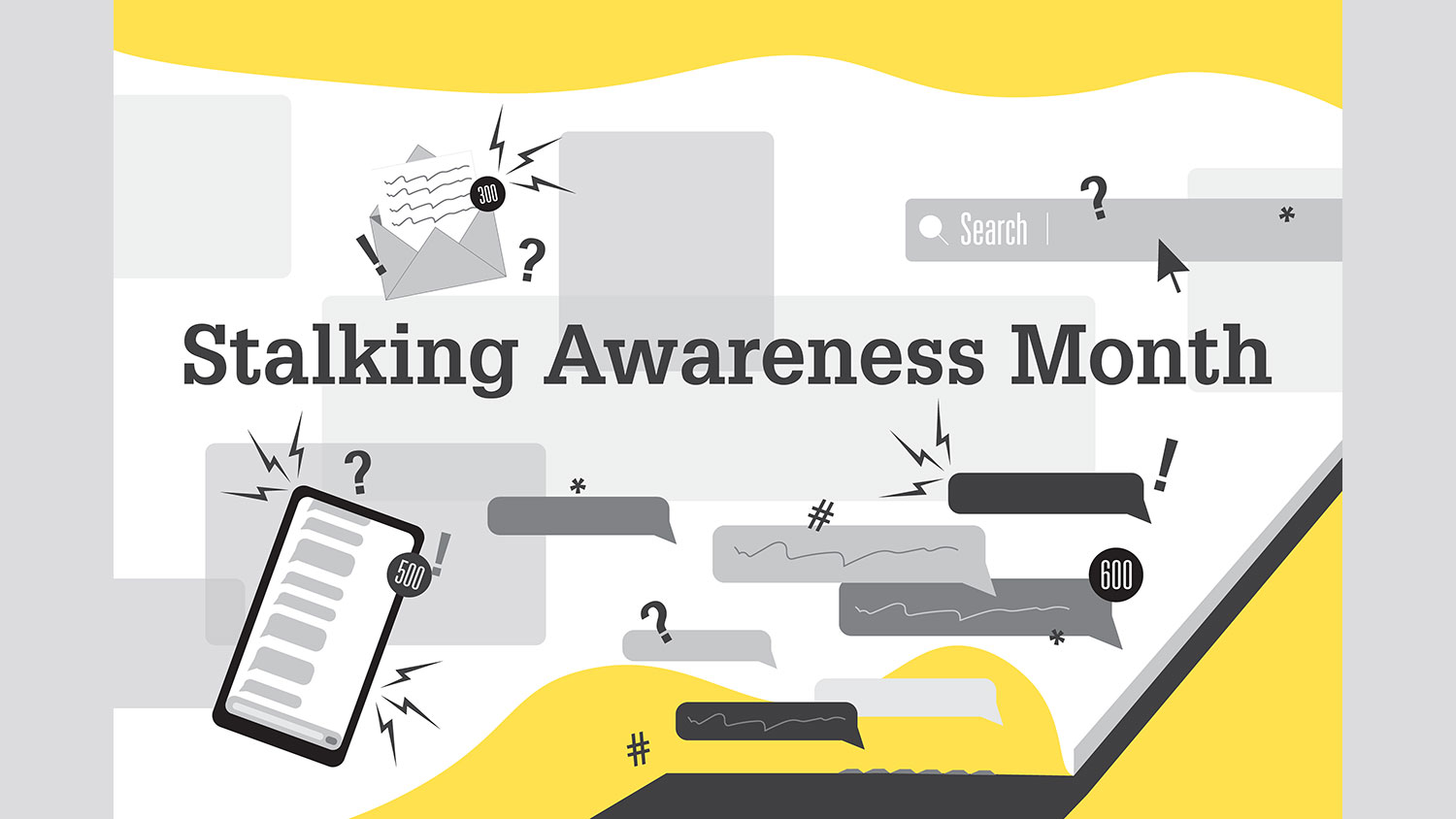Stalking Awareness Takes Focus in the Women’s Center

January is stalking awareness month. Stalking, unfortunately, receives less attention than other forms of interpersonal violence in areas like policy, victim resources and prevention.
The criminalization of stalking only began recently in the early 1990s. Modern media continues to portray stalking as a harmless and even endearing act of love that a man exhibits because he is in love with a woman. In reality, people of all genders can be victims (and perpetrators) of stalking.
Images like those we often see in the media romanticize the idea of stalking rather than bringing awareness to how dangerous it is for victims. Unwanted stalking behaviors often invade a person’s privacy, space and sense of safety. Stalking can include receiving repeated contact, following the victim physically or virtually, damaging property, threatening the victim and more. Stalkers use obsessive behaviors as a way to exhibit power and control, like many other forms of interpersonal violence. Someone who encounters stalking can experience both short- and long-term effects. These effects can be physical, mental, social and economic. Some short-term effects could include intense fear, change of routine, avoidance of social situations or poor work or academic performance. Long-term effects could include sleep disorders, anxiety or depression.
College students are especially vulnerable to stalking. This may be due to the more frequent use of social media by college students and the personal information shared on these public platforms. About 5.8% of college students have experienced stalking since beginning their studies. Usually, a perpetrator of stalking is a former or current partner of the victim. If the perpetrator is a current or former partner, physical violence is more likely to occur.
In some instances, stalking has become easier for perpetrators during lockdown for COVID-19. With stay-at-home orders in place, victim’s whereabouts are much easier to track. Apps like Instagram make it easy to tag your location when you post, and Snapchat has a feature that allows your location to be available at all times. It is important to keep in mind which apps have access to your personal information and location. Resources for victims may also be more difficult to access because of lockdown. Because many organizations that offer assistance and support have moved to virtual services, they may be less visible in public and more difficult for those who do not have access to reliable technology or wi-fi.
A Day of Events
On Jan. 29, 2021, the Women’s Center held a full day of programming for stalking awareness month. The first workshop of the day, “Stalking is NOT Romantic,” discussed the implications of romanticizing stalking and other forms of interpersonal violence in movies and TV.
Women’s Center staff explained how this romanticization of stalking and IPV can potentially normalize and encourage stalking behaviors. The “Safety Planning” workshop featured staff from Student Legal Services (SLS), the Department of Risk Assessment and the Office for Institutional Equity and Diversity (OIED). Krista Morris-Lehman from the Department of Risk Assessment recommended techsafety.org for tips on how to stay safe online and with other technology. Speakers also shared how to protect yourself from stalking using resources like the Safe at NC State website, and what actions to take if you are being stalked. David Elrod, OIED and Pam Gerace, SLS discussed NC State’s policies on stalking as well as legal services available to students. Women’s Center staff and The Movement Peer Educators hosted panel discussions where participants were welcomed to ask questions about stalking and supporting survivors.
If you know a survivor of stalking, thank them for sharing their story with you, let them take the lead on their healing journey and be there to listen to and support them.
** If you or someone you know is experiencing relationship violence, sexual violence, stalking or any other form of interpersonal violence and are in need of advocacy services, the NC State Women’s Center has trained advocates available to offer crisis intervention, emotional support, resources, and referrals. Students can contact the 24/7 Sexual Assault Helpline at 919.515.4444 or ncsuadvocate@ncsu.edu to be connected with an advocate for remote support via phone, Zoom or Google Hangout.
Advocacy services through the NC State Women’s Center are available for all students inclusive of all gender identities and sexual orientations.
For more information on advocacy services, please visit go.ncsu.edu/supportsurvivors. You may also visit go.ncsu.edu/safe for additional information on resources and reporting options.
Resources Cited
- All stalking victims suffer lasting psychological damage, new research finds (Police Professional, Apr. 8, 2019)
- Campus Sexual Violence: Statistics (Rainn.org, 2014)
- Dealing with the unknown: Learning from stalking victims’ experiences (Korkodeilou, J., Crime Prevention and Community Safety, 16(4), 2014)
- January is Stalking Awareness Month (Diversity Digest, Jan. 11, 2018)
- Intimate Partner Stalking among College Students: Examining Situational Contexts Related to Police Notification (Augustyn, M.B., Rennison, C.M., Pinchevsky, G.M. et al., J Fam Viol 35, 679–691, 2020).
Carlyn Wright-Eakes is the interpersonal violence prevention education coordinator in the Women’s Center. Caylee Wingate is majoring in social work with a minor in criminology and is an intern in the Women’s Center.


